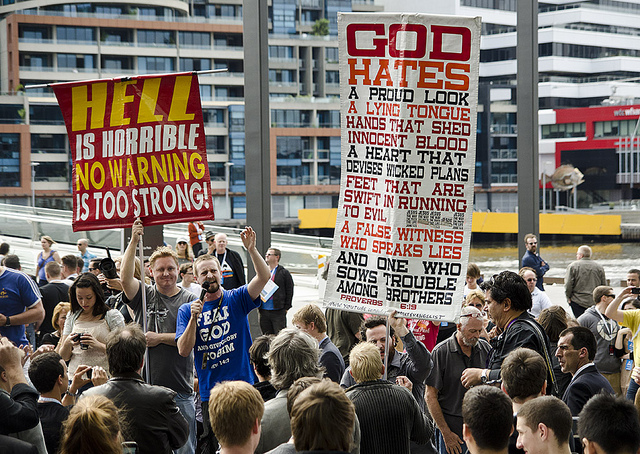 |
| Is this what Jesus had in mind when said, "Go into all the world..." |
What then should the average Christian think in response to such demonstrations, most of which involve anger and shouting, a tactic far more likely to make enemies than friends. Should Christians care about offending the Lost? Should we be presenting the Gospel with anger or love?
The most important question, which should be obvious to all who claim to be followers of Jesus Christ but perhaps is not, is this: What does the Word of God say about the tactics we should be using to witness to those who don't know Jesus as Lord and Savior?
1 Peter 3:15-16 is one such key passage, "But in your hearts set apart Christ as Lord. Always be prepared to give an answer to everyone who asks you to give the reason for the hope that you have. But do this with gentleness and respect, keeping a clear conscience, so that those who speak maliciously against your good behavior in Christ may be ashamed of their slander."
Do you mean, Peter didn't write, "Shout at the unbelievers, ridicule them, call them names, for then they will want to join you." And he didn't write, "disrespect the lost, treat them with unkindness, and say horrible things, especially false ones, about anyone who dares to befriend an unbeliever."
Peter did write that we must witness with gentleness and respect, and he did write that we must conduct ourselves always with good behavior as representatives of Christ.
So, why all the yelling, why the hatred? For some, it is a misguided notion that they have to defend the Law of God against societal or governmental forces, and therefore they have appointed themselves as judge, jury, and executioner on God's behalf. For others, it might be a form of racism or ideology based hatred that is driving their counter-productive attempt to hate-witness. The most obvious example of this in action in the West today relates to Islam. There are some in the Christian community, at least they claim to represent Christ, who feel the need to warn about the dangers (which are of an apocalyptic level in their mind) of terrorism from individuals/organizations influenced by Islam, and therefore their only interaction with Islam is angry and militant. They say things like "All Muslims are terrorists", or "Islam is of the devil". They think that they're defending Western civilization and Christendom, but in reality all they accomplish is to make terrorism more likely by further marginalizing Muslims living in Western nations, and even more importantly, shutting the door against the Gospel's message even more firmly. What Muslim, who believes in Muhammad and the Qur'an, is going to listen to what you have to say about the love of God and the desire that God has to offer forgiveness in Christ, when you approach that Muslim by insulting Muhammad and spitting upon the Qur'an? In what reality does this tactic work even 1 in a million times?
Do you want the Lost to hear the Gospel so that they can be saved, or do you just want credit for yelling it at them? Do you actually love the Lost, in imitation of our heavenly Father, who sent his Son to die for our sins, while we were still sinners, or has hatred clouded your mind and convinced you that some people are beyond God's saving grace? (As if you deserved God's grace, but they don't!)
If you can't speak to those who don't know Jesus with gentleness and respect, maybe you should just keep your yap shut and let those whose hearts are burdened for a world full of people without God's love in their lives, be the ones to represent Jesus.
